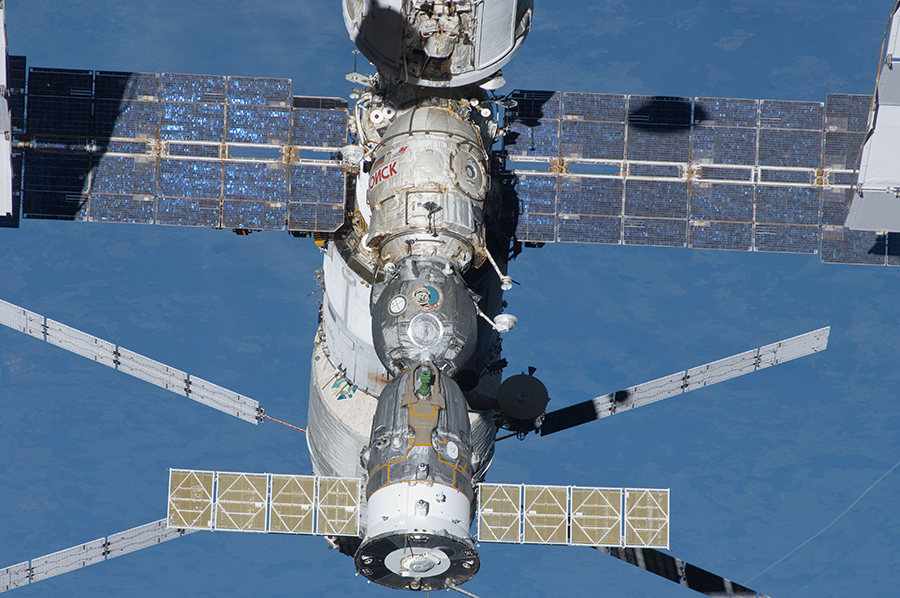“For 50 years, the Arms Control Association has educated citizens around the world to help create broad support for U.S.-led arms control and nonproliferation achievements.”
UN Panel Approves Working Group on Space
December 2021
By Mary Ann Hurtado
A UN panel has agreed to create an open-ended working group aimed at preventing an arms race in space, a major concern among UN member nations.
The UN General Assembly First Committee, which deals with disarmament and international security threats, voted 163–8 on Nov. 1 to establish the new group. It was proposed by the United Kingdom with support from nearly 40 other countries, including the United States. The working group will consider threats to space systems and recommend rules of the road for military activities in outer space.
 “The prevention of an arms race in outer space is a UK priority,” James Cleverly, the minister leading the UK portfolio on space security, said after the vote. “There is no doubt that there is a growing range of threats to space systems, and a risk that those threats could lead to miscalculation and, in turn, escalation and conflict. Only together can we find solutions to keep space peaceful, sustainable, and open to all,” he added.
“The prevention of an arms race in outer space is a UK priority,” James Cleverly, the minister leading the UK portfolio on space security, said after the vote. “There is no doubt that there is a growing range of threats to space systems, and a risk that those threats could lead to miscalculation and, in turn, escalation and conflict. Only together can we find solutions to keep space peaceful, sustainable, and open to all,” he added.
The General Assembly is expected to formally approve the working group in December. According to the resolution, the group will “work on the basis of consensus, hold its organizational session in Geneva for two days, and meet in Geneva for two sessions of five days each in both 2022 and 2023.” A report to the General Assembly is due in the fall of 2023.
Driving this action is concern for the security of thousands of satellites and vehicles in orbit, such as the International Space Station. The United States has long dominated space, but many other nations also have valuable assets there. In the U.S. case, satellites enable the Pentagon to locate enemies on the battlefield, verify arms control treaties, and ensure early warning if an adversary targeted the country with a missile.
During the Cold War, the United States and Russia engaged in limited testing of anti-satellite (ASAT) weapons. Russia tested one on Nov. 15 to destroy one of its own satellites, causing astronauts on the space station to take shelter when the craft intersected with the debris.
China and Russia are developing offensive capabilities, including jammers, lasers, and cyberweapons that could damage satellite operations. Even so, they have attempted to secure a ban on placing weapons in outer space within the Conference on Disarmament (CD), but the proposals have failed to generate traction. (See ACT, December 2020; November 2019.)
U.S. officials, meanwhile, have pressed countries to adopt a basic set of norms and rules for operating in space. In April, Gen. John Raymond, the chief of space operations, described the domain as the “Wild West.” In July, Defense Secretary Lloyd Austin signed a memo pledging that the Pentagon would follow five “tenets of responsible behavior in space,” including operating with “due regard” for others and limiting the creation of space debris.
The First Committee meeting dealt with many other issues related to nuclear, chemical, biological, and conventional weapons.
On biological weapons, the COVID-19 pandemic heavily shaped the discussions. The United States proposed strengthening the 1972 Biological Weapons Convention (BWC) and promoting more rigorous compliance, but did not detail its plans. China urged member states to conduct responsible, bioscientific research and adopt the Tianjin Biosecurity Guidelines for Codes of Conduct for Scientists at the ninth BWC review conference in 2022. China, with Russian and Iranian support, also encouraged adoption of the legally binding BWC protocol and a “credible verification mechanism” to ensure adherence to BWC obligations.
U.S., European, and South Korean representatives urged North Korea to resume talks on its nuclear weapons program without preconditions. The UK in particular noted growing concerns about Pyongyang’s repeated ballistic missile launches. But China said that unnamed “relevant parties” should cease escalating tensions and implied that UN sanctions on North Korea should be lifted.
Meanwhile, Russia and the United States highlighted their recent decision to extend the 2010 New Strategic Arms Reduction Treaty (New START) until February 2026. Washington said the extension laid a “firm foundation” for potential future arms control with Moscow and emphasized the importance of their bilateral strategic stability dialogue, which resumed over the summer. (See ACT, September 2021.) Moscow stressed the need to develop a new “security equation” that would consider strategic stability factors.
France, South Korea, and the United States pressed the case of Alexei Navalny, the Russian opposition leader who has blamed the Kremlin for his poisoning with the nerve agent Novichok in 2020. Some states also emphasized the need to hold Syria to account for repeated violations of the Chemical Weapons Convention.
Ahead of the review conference for the nuclear Nonproliferation Treaty (NPT) in January, China, Russia, and North Korea expressed frustration with a lack of U.S. progress on its obligations under Article VI, which requires the treaty’s five nuclear-armed states-parties to take meaningful steps toward disarmament.
Beijing urged Washington to “abandon the Cold War zero-sum mentality” and safeguard global strategic stability, including by rejecting a new deal with the UK to supply Australia with nuclear-powered submarines. (See ACT, October 2021.)
Russia said that by halting “face-to-face” diplomacy, the COVID-19 pandemic harmed the efficiency of the First Committee and the CD and increased tensions among member states. The UK countered that the lack of progress, especially in the CD, should be attributed to the states that prevented the adoption of a work program.
